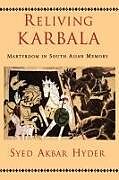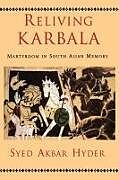Reliving Karbala
Einband:
Kartonierter Einband (Kt)
EAN:
9780195373028
Autor:
Syed Akbar Hyder
Herausgeber:
Oxford University Press
Erscheinungsdatum:
01.09.2008
Zusatztext Reliving Karbala is a significant contribution to the existing scholarship on Karbala. Hyder adds vitality and depth to his analysis through a range of personal anecdotes, including memories of his own experience of growing up between cultures. This book is an invaluable resource from whcih students of various disciplines will benefit. Klappentext In 680 C.E., a small band of the Prophet Muhammads family and their followers, led by his grandson, Husain, rose up in a rebellion against the ruling caliph, Yazid. The family and its supporters, hopelessly outnumbered, were massacred at Karbala, in modern-day Iraq. The story of Karbala is the cornerstone of institutionalized devotion and mourning for millions of Shii Muslims. Apart from its appeal to the Shii community, invocations of Karbala have also come togovern mystical and reformist discourses in the larger Muslim world. Indeed, Karbala even serves as the archetypal resistance and devotional symbol for many non-Muslims. Until now, though, little scholarly attention has been given to the widespread and varied employment of the Karbala event. In Reliving Karbala, Syed Akbar Hyder examines the myriad ways that the Karbala symbol has provided inspiration in South Asia, home to the worlds largest Muslim population. Rather than a unified reading of Islam, Hyder reveals multiple, sometimes conflicting, understandings of the meaning of Islamic religious symbols like Karbala. He ventures beyond traditional, scriptural interpretations to discuss the ways in which millions of very human adherents express and practice their beliefs.By using a panoramic array of sources, including musical performances, interviews, nationalist drama, and other literary forms, Hyder traces the evolution of this story from its earliest historical origins to the beginning of the twenty-first century. Today, Karbala serves as a celebration of martyrdom, a source of personal and communal identity, and even a tool for political protest and struggle. Hyder explores how issues related to gender, genre, popular culture, class, and migrancy bear on the cultivation of religious symbols. He assesses the manner in which religious language and identities are negotiated across contexts and continents. At a time when words like martyrdom, jihad, and Shiism are being used and misused for political reasons, this book provides much-needed scholarly redress. Through his multifaceted examination of this seminal event in Islamic history, Hyder offers an original, complex, and nuanced view of religious symbols. Zusammenfassung In 680 C.E., a small band of the Prophet Muhammads family and their followers, led by his grandson, Husain, rose up in a rebellion against the ruling caliph, Yazid. The family and its supporters, hopelessly outnumbered, were massacred at Karbala, in modern-day Iraq. The story of Karbala is the cornerstone of institutionalized devotion and mourning for millions of Shii Muslims. Apart from its appeal to the Shii community, invocations of Karbala have also come togovern mystical and reformist discourses in the larger Muslim world. Indeed, Karbala even serves as the archetypal resistance and devotional symbol for many non-Muslims. Until now, though, little scholarly attention has been given to the widespread and varied employment of the Karbala event. In Reliving Karbala, Syed Akbar Hyder examines the myriad ways that the Karbala symbol has provided inspiration in South Asia, home to the worlds largest Muslim population. Rather than a unified reading of Islam, Hyder reveals multiple, sometimes conflicting, understandings of the meaning of Islamic religious symbols like Karbala. He ventures beyond traditional, scriptural interpretations to discuss the ways in which millions of very human adherents express and practice their beliefs.By using a panoramic array of sources, including musical performances, interviews, nationalist drama, an...
Klappentext
In 680 C.E., a small band of the Prophet Muhammads family and their followers, led by his grandson, Husain, rose up in a rebellion against the ruling caliph, Yazid. The family and its supporters, hopelessly outnumbered, were massacred at Karbala, in modern-day Iraq. The story of Karbala is the cornerstone of institutionalized devotion and mourning for millions of Shii Muslims. Apart from its appeal to the Shii community, invocations of Karbala have also come to govern mystical and reformist discourses in the larger Muslim world. Indeed, Karbala even serves as the archetypal resistance and devotional symbol for many non-Muslims. Until now, though, little scholarly attention has been given to the widespread and varied employment of the Karbala event.
In Reliving Karbala, Syed Akbar Hyder examines the myriad ways that the Karbala symbol has provided inspiration in South Asia, home to the worlds largest Muslim population. Rather than a unified reading of Islam, Hyder reveals multiple, sometimes conflicting, understandings of the meaning of Islamic religious symbols like Karbala. He ventures beyond traditional, scriptural interpretations to discuss the ways in which millions of very human adherents express and practice their beliefs. By using a panoramic array of sources, including musical performances, interviews, nationalist drama, and other literary forms, Hyder traces the evolution of this story from its earliest historical origins to the beginning of the twenty-first century.
Today, Karbala serves as a celebration of martyrdom, a source of personal and communal identity, and even a tool for political protest and struggle. Hyder explores how issues related to gender, genre, popular culture, class, and migrancy bear on the cultivation of religious symbols. He assesses the manner in which religious language and identities are negotiated across contexts and continents.
At a time when words like martyrdom, jihad, and Shiism are being used and misused for political reasons, this book provides much-needed scholarly redress. Through his multifaceted examination of this seminal event in Islamic history, Hyder offers an original, complex, and nuanced view of religious symbols.
Inhalt
Notes on Transcription
1: Introduction: To Die and Yet Live
2: Visions and Re-visions of Karbala and the Shii Majlis
3: Mourning in Migrant Spaces: South Asian Majlises in the United States
4: Commemorative Politics and Poetics: Karbala From Ali to Zainab
5: Lyrical Martyrdom: Karbala in the Qawwali Tradition
6: Iqbal and Karbala: Re-reading Martyrdom for a Poetics of Appropriation
7: From Communal to Ecumenical: Martyrdom Beyond Mourning and Mysticism
8: Conclusion: Thirst as the Water of Life
Notes
Glossary
Bibliography

Leider konnten wir für diesen Artikel keine Preise ermitteln ...
billigbuch.ch sucht jetzt für Sie die besten Angebote ...
Die aktuellen Verkaufspreise von 6 Onlineshops werden in Realtime abgefragt.
Sie können das gewünschte Produkt anschliessend direkt beim Anbieter Ihrer Wahl bestellen.
Loading...
Die aktuellen Verkaufspreise von 6 Onlineshops werden in Realtime abgefragt.
Sie können das gewünschte Produkt anschliessend direkt beim Anbieter Ihrer Wahl bestellen.
| # | Onlineshop | Preis CHF | Versand CHF | Total CHF | ||
|---|---|---|---|---|---|---|
| 1 | Seller | 0.00 | 0.00 | 0.00 |
